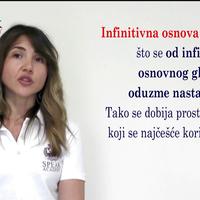Lesson 9.1 Serbian Language - Future Time (Futur)
|||Future tense||
|||Futuro|Tiempo futuro|
Lektion 9.1 Serbische Sprache – Zukunftszeit (Futur)
Lesson 9.1 Serbian Language - Future Time (Futur)
Lección 9.1 Idioma serbio - Tiempo futuro (Futur)
Leçon 9.1 Langue serbe - Temps futur (Futur)
Урок 9.1 Сербский язык - будущее время (Futur)
Ders 9.1 Sırp Dili - Gelecek Zaman (Gelecek)
Buduće vreme (FUTUR)
future|tense|
future tense (FUTUR)
Podsetimo se kako glasi glagol hteti u prezentu jer će nam trebati za građenje budućeg vremena
let's recall|||||||||||need||||
Przypomnijmy sobie|||brzmi||chcieć||||||||budowanie czasu przyszłego||
Let's remember how the verb to want sounds in the present because we will need it to build the future tense
Rekli smo da glagol hteti ima duže i kraće oblike
||||||||shorter|forms
We said that the verb to want has longer and shorter forms
Sada će nam biti potrebni samo kraći oblici
||||needed|||
|||||||formy
Now we will only need the shorter forms
Glagol hteti (potvrdni oblik)
|chcieć|potwierdzający|
Verb to want (affirmative form)
Ja ću
|będę
I will
Ti ćeš
|you will
You'll
on / ona / ono će
|||będzie
he / she / it will
mi ćemo
|będziemy
we will
vi ćete
You will
oni / one / ona će
|||van a
they / they / she will
odrični oblik
negative|negative form
negative form
ja neću
|nie chcę
I will not
ti nećeš
|will not
you will not
on / ona / ono neće
|||will not
he / she / it won't
mi nećemo
we won't
vi nećete
|will not
you won't
oni / one / ona neće
they / they / she won't
Buduće vreme gradi se od kraćih oblika pomoćnog glagola hteti i celog infinitiva glagola. Na dva načina
|||||shorter||||||whole|infinitive||||ways
||buduje|||krótszych|||||||||||
The future tense is built from shorter forms of the auxiliary verb to want and the full infinitive of the verb. In two ways
kraći oblici pomoćnog glagola hteti (ću , ćeš , će i tako dalje) + infinitiv,
|forms||||||||||infinitive
shorter forms of the auxiliary verb want (will, will, will and so on) + infinitive,
ili infinitiv + kraći oblici pomoćnog glagola hteti
or infinitive + shorter forms of the auxiliary verb to want
Kada ćeš doći? Doći ću Sutra
||come|||
||przyjść|||
When will you come? I will come tomorrow
Sada da vidimo na konkretnim primerima kako se gradi buduće vreme glagola doći, gledati, jesti (glagoli na -ći -ti -sti )
||||specific|examples||||future tense|||||to eat|||future tense||to come
|||||||||||||||verbos||||
Now let's see with concrete examples how the future tense of the verbs to come, to watch, to eat (verbs in -ci -ti -sti) is formed.
Sutra ću doći kod tebe
||come over||
I will come to you tomorrow
Sledeće nedelje ćemo gledati taj film u bioskopu
|||||||the cinema
We will see that movie in the cinema next week
Oni će jesti kod tebe
They will eat at your place
Kraći oblik glagola nikada ne stoji na početku rečenice
|||||||beginning of|
The shorter form of the verb never comes at the beginning of the sentence
Drugi način u građenju je sledeći:
Second|way||building||
Another way to build is as follows:
infinitivna osnova glagola na -ti + kraći oblici glagola hteti
infinitive|infinitive base|||||||
infinitive stem of the verb in -ti + shorter forms of the verb to want
Infinitivna osnova dobija se tako što se od infinitiva osnovnog glagola oduzme nastavak -ti
|||||||||basic infinitive||subtract|suffix|
The infinitive stem is obtained by subtracting the suffix -ti from the infinitive of the base verb
Tako se dobija prosti oblik futura koji se najčešće koristi u govoru
|||simple|||||most often|||
This is how the simple form of the future is obtained, which is most often used in speech
Kucati:
Knock(1)
Type:
Dakle kada smo imali ceo infinitiv to se pisalo odvojeno od glagola hteti.
|||we had|whole infinitive||||it was written|separately|||
So when we had the whole infinitive, it was written separately from the verb to want.
Sada se piše spojeno
|||as one word
Now it is written connected
Čekati
Wait
Čekaćemo Maju ispred bioskopa
We will wait|||
We will wait for Maya in front of the cinema
Sešćeš na kauč
you will sit||couch
Ovde ste primetili jednu glasovnu promenu:
||noted||vocal|change
You've noticed a voice change here:
infinitiv glasi sesti, a buduće vreme: sešćeš, sešću, sešće.
||to sit|||||I will sit|he/she/it will sit
the infinitive reads sesti, and the future tense: sešcej, sešće, sešće.
Dakle glas S prešao je u glas Š
|||changed||||
So the voice of S changed into the voice of Š
To je jedna glasovna promena koja se dešava radi lakšeg izgovora
|||sound||||occurs||easier|pronunciation
It is a voice change that occurs for easier pronunciation
Zapamtite: glas S ispred glasa Ć prelazi u Š
Remember||||letter||||
Remember: the S sound before the Ć sound changes to Ш
Glagoli na -ĆI imaju samo složeni oblik futura
|||||compound||
Verbs in -ĆI have only the complex future form
Zaobići
to bypass
Bypass
Naravno, postoji i drugi način građenja a to je da najpre stavimo infinitiv, a zatim -ću,ćeš,će, odnosno kraće oblike pomoćnog glagola hteti
|there is|||||||||first|||||||||||||
Of course, there is another way of construction, which is to put the infinitive first, and then -ću, ćeš, će, i.e. shorter forms of the auxiliary verb to want
Bufdući da je ovo ceo infinitiv, u oba slučaja glagoli se pišu odvojeno
Gerund form||||whole||||cases|||are written|
Since this is the entire infinitive, in both cases the verbs are written separately
Zaobići ćemo šoping centre
||shopping|shopping center
We will bypass the shopping centers
Ako uđemo, potrošićemo više nego što smo planirale
|we enter|we will spend|||||planned
If we go in, we will spend more than we planned

